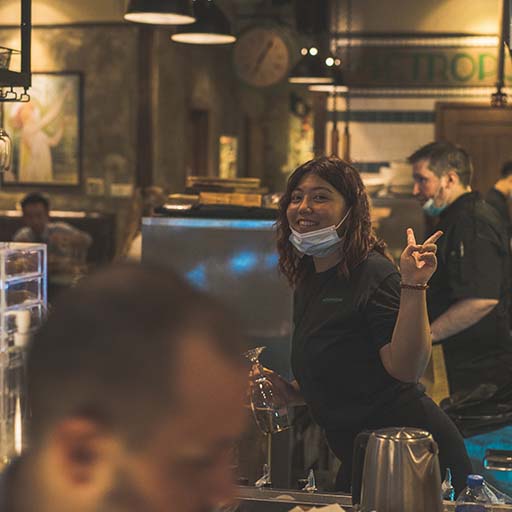
Effective Team Mentoring and Coaching
Discover the difference mentoring and coaching can make to your staff's confidence, teamwork and capability to deliver success.
Estimated reading time: 3 minutes
Exceptional service and teamwork are paramount in the hospitality industry, and mentoring and coaching are vital to developing your team's confidence and capability to deliver success.
What is the Difference Between Mentoring and Coaching?
Mentoring is a long-term relationship where an experienced team member imparts their knowledge and experience to a less experienced member, guiding their career development and progress.
Coaching is a more structured and goal-orientated process focusing on improving skills and achieving specific objectives. In the context of a bar or restaurant business, mentoring nurtures the holistic growth of a team member, whereas coaching develops and enhances the specific skills they require to fulfil their role.
On-The-Job Mentoring
Within a bar and restaurant business mentoring is a powerful tool for instilling values, building personal connections and encouraging your team to develop together.
Pair your more experienced servers or bartenders with new starters or less experienced team members.
Showing rather than telling gives new starters a practical way to learn the technical and service skills needed for their role.
Regular one-to-one mentoring sessions allow room for discussing challenges, setting goals, and receiving personalised guidance and valuable feedback.
Top Tips to Be an Effective Mentor

Top Tips to Be an Effective Mentor
Lead by example - Demonstrate the values and behaviours you want your team to embody.
Practice active listening - Understand your team members' aspirations and challenges and help create pathways for their progress and development.
Provide feedback - Offer constructive feedback that is specific, actionable and growth-orientated.
Offer guidance - Encourage critical thinking by asking questions that guide the individual to the appropriate solution.
Set realistic goals - Collaborate on short-term and long-term objectives, measure performance and discuss progress and challenges.
Celebrate success - Recognise milestones and progress and celebrate achievements to boost morale and maintain motivation.
On-The-Job Coaching
Coaching can complement mentoring by addressing specific skills gaps and enhancing performance.
Consider scenarios specific to your operation where coaching can be beneficial.
Include your processes and procedures, from serving tableside to how you craft your cocktails.
Provide instruction, observation, regular feedback, and guidance to course-correct specific behaviours and skills.
Create an environment where your team feel comfortable seeking advice and assistance.
Encourage a culture of continuous improvement by combining coaching with the setting of clear, measurable performance objectives, providing constructive feedback, and targeted training.
Top Tips to Be an Effective Coach

Top Tips to Be an Effective Coach
Tailored coaching plans - Create coaching strategies specific to different job roles, measure their effectiveness and amend to improve their effectiveness.
Focus on strengths - Identify and leverage the strengths of individual team members for overall team benefit. For example, ask your fastest bartender to help coach your slowest to improve their efficiency and speed.
Encourage self-assessment - Promote self-awareness and self-improvement through reflection. If a team member has a tough shift, encourage them to think about why and discuss ways to avoid repeating the situation.
Constructive feedback - Offer feedback in a way that empowers individuals within your team to make positive changes and create solutions.
Regular check-ins - Schedule periodic reviews to assess progress, adjust individual goals and evolve your coaching strategies.
Our industry thrives on exceptional teamwork, where each member creates memorable experiences for our guests. Mentoring and coaching will help you nurture a team that can confidently deliver their roles, embody your business's ethos and ultimately deliver a superior guest experience for a more successful business.
Key Takeaways
Understanding the Difference: Mentoring is a long-term relationship focused on career development and holistic growth, while coaching is a structured, goal-oriented process for improving specific skills.
On-The-Job Mentoring: Pairing experienced team members with newcomers fosters personal connections and facilitates skill development.
On-The-Job Coaching: Complement mentoring with coaching to address skill gaps and enhance performance. Regular feedback, guidance, and a supportive environment are key components of effective coaching.
Effective Mentoring: Effective mentors lead by example, practice active listening, provide constructive feedback, offer guidance through critical thinking, set realistic goals, and celebrate achievements.
Effective Coaching: Effective coaches tailor strategies to different job roles, focus on individual strengths, encourage self-assessment and reflection, provide constructive feedback, and conduct regular check-ins to assess progress and adjust strategies.
Sign up for free and become a member of Diageo Bar Academy today to unlock the latest industry news, trends, and tips to keep your bar knowledge up to speed!
Related content

Best Practices for Effective Staff Training
Train your team for success. Explore effective training strategies, including on-the-job training, performance reviews and ongoing staff development plans.
How to Retain a Dream Bar Team
Reducing staff turnover is key for hospitality businesses. Improving staff retention will reduce your recruitment costs and increase return on investment in training, while a happier team will deliver more for your guests and your business.
Scheduling Your Team to Optimise Peak Performance Quiz
Are you running your venue efficiently? Take this quiz to see if you have what it takes to unlock your team's potential and optimise performance.
Create a Profitable Bar Menu
A great menu is more than just a list of drinks you sell. Watch this video as Julian de Féral discusses tips for creating a profitable bar menu.
Social Media Basics for Bar Professionals
Social media allows you to connect with a large audience to grow your bar business. Watch this video as Influencer Natalie Migliarini from Beautiful Booze takes you through a social media 101.
